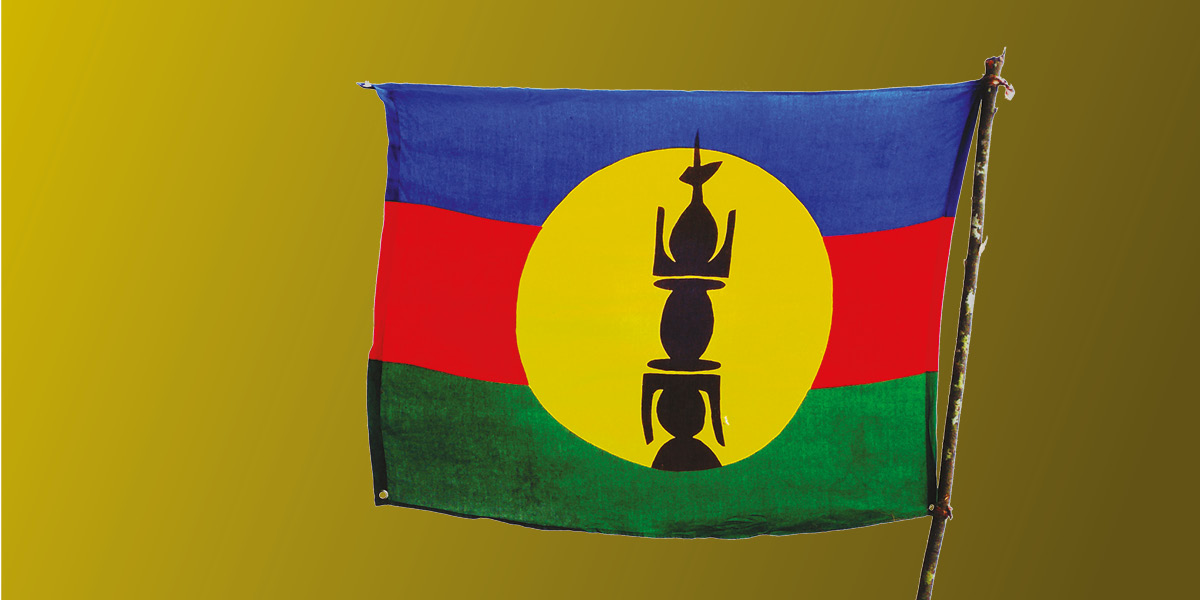1774
Captain James Cook lands on Kanaky, naming the island ‘New Caledonia’ after the Latin name for Scotland.
1853
Admiral Auguste Febvrier-Despointes declares French sovereignty over Kanaky in the name of Emperor Louis Napoleon III.
1864
Nickel is discovered by Jules Garnier. As of 2024, Kanaky holds between 20 and 30 per cent of the world’s known nickel reserves, making up 90 per cent of the territory’s exports.
1871
Following the suppression of the Paris Commune, many communards are exiled to Kanaky. Among them is anarchist Louise Michel, who expresses solidarity with the Kanak people’s struggle against French colonisation. However, most communards side with France against the Kanak people during the 1878 uprising.
May – December 1878
The forcible displacement of the Kanak people onto reservations and seizure of their arable land by settlers sparks an uprising led by Chief Ataï. An estimated 600 Kanak insurgents and 200 settlers die in the fighting as the rebellion is violently suppressed. Up to 5 per cent of the Kanak population is killed or forced into exile, and many Kanak chiefs are summarily executed. Ataï himself is killed and his head is sent to Paris, where it is displayed at various museums. It is only returned to Kanaky in 2014.
1887
The Code de l’indigénat (Native Code) is implemented, officially rendering the Kanak people colonial subjects of France – while denying them French citizenship.
1917 – 1918
A second uprising breaks out against French rule, sparked by settlers’ encroachment into the remaining Kanak land, in the highlands, and attempts to pressure Kanak men to fight in the first world war. The uprising is suppressed.
1946
Kanaky is organised into a French overseas territory, granting Kanaks French citizenship.
1984
Following a growing resistance movement in the 1960s and 1970s – largely in response to a new wave of French government backed settlers – a coalition of pro-independence parties forms the Front de Libération Nationale Kanak et Socialiste (FLNKS), the Kanak and Socialist National Liberation Front. The resistance is now more organised, leading a boycott by force of the November regional elections and the occupation of the settler village of Thio. In response, French settlers kill ten Kanaks in the Hienghène massacre of December 1984. This period of violence is often referred to as ‘les evènements’ (the events).
January 1985
French military police assassinate Éloi Machoro, who had led the election boycott and occupation of Thio.
22 April – 5 May 1988
Armed FLNKS members assault a police station on the island of Ouvéa, intending to raise the Kanak flag over the station. A melee ensues in which four gendarmes are killed and 27 others taken hostage in the nearby Gossanah cave. After days of negotiations, French authorities decide to launch an assault, killing 19 Kanaks.
1988
Following the Ouvéa cave massacre, the French government and the FLNKS agree to peace talks, culminating in the Matignon Accords. Alongside providing amnesty for the Ovéa cave hostage takers, they set out measures to rectify the political and economic marginalisation of the Kanak people and establish a ten-year transition period towards autonomy. Kanak leaders agree to refrain from agitating for independence in return. The agreement is signed by French prime minister Michel Rochard, FLKNS leader Jean-Marie Tjibaou and head of the anti-independence settler party Rassemblement pour une Calédonie dans la République (Rally for Caledonia in the Republic) Jaques Lafleur. Tjibaou is later assassinated, on 4 May 1989, alongside fellow FLNKS leader Yeiwéné Yeiwéné by Djubelly Wea, a member of the United Kanak Liberation Front angered by their cooperation in the peace process.
1998
The Nouméa Accord, named after Kanaky’s capital city, sets out a 20 year path towards independence. Crucially, the accord bars new arrivals from voting in elections in Kanaky until after ten years, to quell the increasing marginalisation of Kanaks.
2018 – 2021
Three independence referendums are held over a three-year period. All result in votes against independence. FLNKS boycotts the third, in 2021, arguing that because the Covid-19 pandemic had disproportionately affected the Kanak community, pro-independence campaigning was virtually impossible. On a turnout of 40 per cent, just 3.5 per cent vote for independence.
2024
Mass unrest, led by the Coordination Unit for Actions on the Ground (CCAT), erupts in response to French lawmakers’ plans to remove voting restrictions on new arrivals to Kanaky for the 15 December provincial election. Riots take place in Nouméa, with roadblocks established by pro-independence activists across the territory. In response, on 16 May, the French government implements a state of emergency, sending thousands of additional police and troops into the territory, imposing a nighttime curfew and banning TikTok.
Despite this repression, President Emanuel Macron is forced to backtrack on the proposed changes to the electoral system. On 28 May, he lifts the state of emergency, but seven pro-independence activists are still sent to France in July for pre-trial detention – including CCAT leader Chris Tein. France announces that provincial elections will be postponed until late 2025. Between May and October 2024, 13 people are killed and almost 3,000 arrested by French authorities.
Further reading
- Anthony Tutugoro – The Strategic “Toolbox” of the Kanak Insurrection (1984-1988) – The Funambulist
- Classic case of colonialism: The Kanaky liberation struggle w/ Tina Ngata – The Red Nation Podcast
- Susanna Ounei – The long struggle of the Kanak people – E-Tangata










